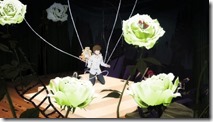 |
 |
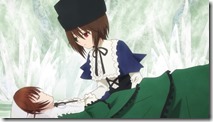 |
Kanaria, I knew you had it in you…
I’ll be the first to say that I never would have suspected that Rozen Maiden had it in itself to be this transcendent and special. I’ve been effusive in my praise for the director and writer of Zurückspulen, and I think with good reason. But I probably haven’t given enough credit to Peach-Pit, because this is their story – and it’s entirely possible that the first two series would have resonated a lot more if they’d more closely followed the original in letter and spirit.
Still, there’s no denying that for me, this series is foremost an illustration of just what a joy it is to watch phenomenally talented artists like Mochizuki and Hatakeyama bring their vision to the small screen in anime form. The remarkable thing about this episode is that I think it could have been watched with the sound turned off and been a fabulously entertaining spectacle – a true visual feast. And just as easily, it would have worked brilliantly as an audio drama, because Mochizuki’s dialogue is letter-perfect. Put those two things together and you have this episode, one of the best of the season from any series.
In addition to putting together the talents of the men behind it, I think this episode for the first time feels like a true fusion of the “old” and “new” faces of Rozen Maiden in anime form. The dolls are prominent, each with their own signature peccadilloes (which can be insufferable in less capable hands), but the feel and tone of the story are very much in-line with the rest of Zurückspulen and its focus on Jun’s personal growth – when Jun decried his own uselessness and resolved that he had to take charge of his own fate, even if he wasn’t sure how, I knew things were still solidly on-track. It certainly doesn’t hurt that Suiseiseki gave her Rosa Mystica to Souseiseki (Morinaga Rika) and thus, fell silent while her sister took the stage – that’s a huge trade-up in my book – but there’s much more to it than that.
For starters, we have a kind of free-for-all sequence where the four sisters present all vie for Jun’s patronage, even as he struggles to free himself from Kirakishou’s thorny embrace. I thought at first this have been the proverbial “unintentionally funny” moment, but in hindsight I realize that the humor here was completely intentional – as serious as things were, I think the sight of the perpetually perplexed Unwound Jun taking in the prospect of the dolls (except Shinku, who showed a distinct reluctance to involve this Jun in matters so desperate) fighting over him harem-style was supposed to be wryly absurd. The peculiar relationship between Rozen Maidens and humans is highlighted here – a kind of perverse anti-symbiosis, really, a parasitic relationship with the parasite pleading its case to the host. But it also highlights the special relationship between Shinku and Jun, and the way she’s more than ever become a kind of stern but loving Aunt to him. Shinku is the only one thinking of Jun here, despite the fact that she stands to disappear in moments as soon as the clock starts again – all of the other dolls have their own self-interested purposes foremost in mind, Suiseiseki and Sugintou no less so than Kirakishou.
Without question, though, the signature scene the episode is building towards is the long-awaited meeting between the young adult and the child Jun. These sorts of meetings-of-the-self in sci-fi and fantasy often disappoint, but I found this one connected, in large part because Sanada Asami really brought just the right tone to the Wound Jun’s half of the conversation. It’s truly fascinating, watching these two study each other, given what each brings to the meeting. The adolescent Jun sees his older self as a bit of a hero – someone who was able to overcome his hikikomori social anxiety and enter the real world as a functioning, which at this point in his young life seems an inconceivably difficult task. But the older Jun sees himself as a failure – someone who contributes nothing to the world and exists in a kind of perpetually grey purgatory – and his younger self as a kind of snotty know-it-all.
What’s interesting here is that it’s the boy who comes off as the more confident and outgoing person than the man, despite his social isolation – even as a hikikomori, he has a vibrancy and hopefulness that a painful life has leeched away from his older self. Yet when boy Jun sees this, that spark fizzles and goes out – because, clearly, knowing that his older self had accomplished the feat of entering the outside world had given him a lot of hope. And it’s seeing the pain and hurt in his younger self that forces adult Jun to realize that things aren’t so hopeless as he imagines – that he’s found things that are worth living for, and worth protecting. It’s the urge to buoy the spirits of his young self – his compassion – that forces this enlightenment and gives him the resolve to go forward and try to preserve the life he thought he hated but now realizes he treasures parts of. Just as it’s the knowledge that he’s capable of breaking out of his self-imposed prison that gives the young Jun the resolve to move forward in his own life. Each of them finds something in the other that they need to make sense of their own lives – which only makes sense, if you stop and think about it.
As to how all that relates to the practicalities of the situation, it’s a bit hard to decipher for the moment – but it seems clear that the “invisible choices” Shinku refers to mean that both Juns exist in a world that’s as real as any other. And refreshingly, it’s Kanaria (in probably her best moment in any Rozen Maiden adaptation – perhaps) who leads Jun back to his own timeline through her Pizzicato. It was perhaps unkind of Jun to mock her speech patterns, but perhaps he simply found himself caught up in her relentless genki energy. On returning Jun finds Souseiseki waiting for him, confirming that involuntarily or not, he’s kissed her ring and formed a contract – and that she remembers every moment of his loving and careful construction of her new body (which prompts a hilarious reaction from Shinku and Sugintou). This is a small taste of why I like Souseiseki best among all the dolls – her reflective, sober and serious manner reflects a soul that’s experienced too much sadness in life to worry about flashy mannerisms and catch phrases. With Souseiseki back in the saddle and Father seemingly preparing to exert his influence directly, we appear to be approaching a crescendo worthy of this outstanding series.
 |
 |
 |
 |
 |
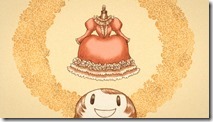 |
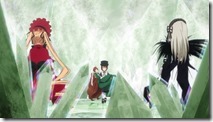 |
 |
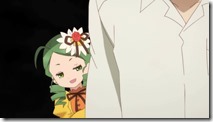 |
 |
 |
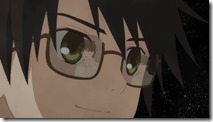 |
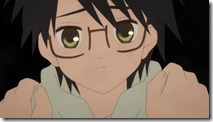 |
 |
 |
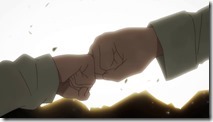 |
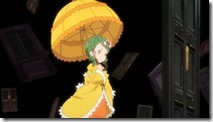 |
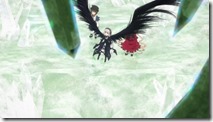 |
 |
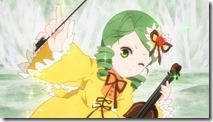 |
 |
 |
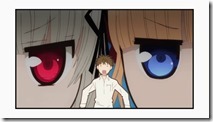 |
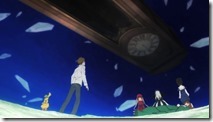 |


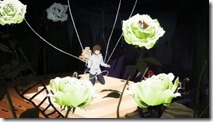

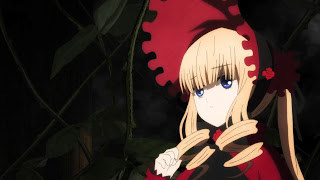
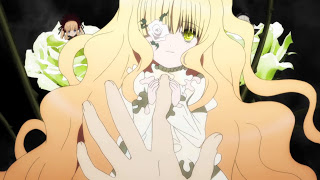
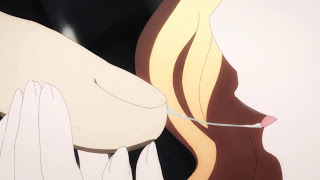
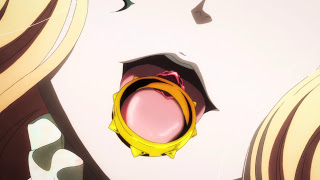
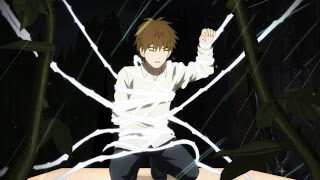



MCAL
September 7, 2013 at 4:17 amThis time six chapters in one episode without feeling rushed… Impressive.
And I suppose having Jun be master to your favorite doll was just icing on the cake, eh Enzo?
admin
September 7, 2013 at 7:55 amIt can't hurt, that's for sure…
Gary Cochran
September 7, 2013 at 9:58 amWow I can't believe Kanaria was actually useful. Now if they can find a way to bring back HinaIchigo?
lkk
September 8, 2013 at 2:43 amAny thoughts as to how the story in the book relates to the larger story? I've been trying to work out the relationship between the two, but I haven't found it yet. What is the book story trying to tell us about the Rosen Maiden story?
admin
September 8, 2013 at 4:03 amI'm not 100% sure myself, but the larger theme of the book seems to be "be careful what you wish for, because you just might get it". I think there may be a larger message that lives can't be changed through magic (even in this mythology) only hard work.